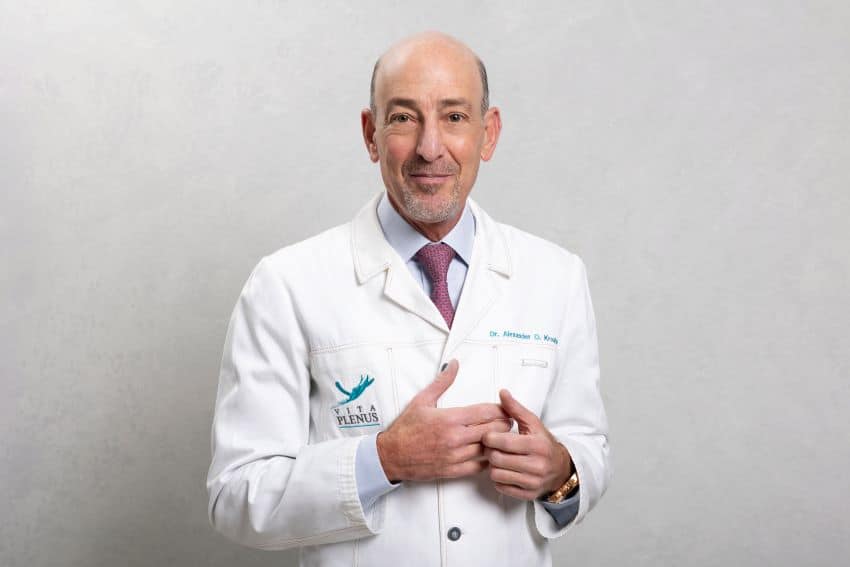The moment Dr. Alexander Krouham knew something was wrong in his career came when, after 20 years of practicing conventional medicine, he began to feel sad. Krouham was not getting to the root of the problem whenever chronic disease appeared in his patients.
“That led to a terrible frustration and I considered leaving medicine for some time. Instead of doing that, I found another path that led me first to something called anti-aging and regenerative medicine, and then to functional medicine, and more recently to lifestyle medicine,” Dr. Krouham told Mexico News Daily.

Now he is back in love with medicine and has become a leader in promoting functional medicine in Mexico. Some of his interviews and podcasts have more than 1.5 million views, and his approach to health resonates in the hearts and minds of many.
For Krouham, functional medicine is not alternative medicine; it is simply a different way of looking at our health. “It is a focus on everything that happens in the organism; functional medicine and lifestyle medicine seek to heal from the bottom, from the roots. It is basically about understanding physiology and biochemistry, how the organism works, what determines changes in the body and how it functions,” he explained.
Functional medicine as a way of thinking
“Originally, the main health problems we had were acute diseases, especially infections and trauma. Today, we face chronic degenerative diseases that obey completely different mechanisms; the conventional health model has not really proven effective in addressing these complications,” said Dr. Krouham.
Essentially, functional medicine focuses on the individual rather than the disease itself; pursuing personalized care. This focus expands the timeline of the person’s life, taking into account all the relevant events that have occurred. It involves thoroughly examining the individual’s medical history to address the issues and focuses holistically on the patient’s organism rather than just the disease itself.

“If you notice, society in general has lost confidence in medicine, and people no longer feel close to the doctor. Therefore, another value of functional medicine is to reconnect the doctor with the patient; to strengthen that crucial doctor-patient relationship.”
The main values of functional medicine focus on personalized attention, taking responsibility for your own health through your lifestyle and habits, and a view of integral health that treats problems by focusing on the complexity of each person’s personal circumstances.
“We need to recognize that even if we have the same disease as someone else, it does not mean that the disease will behave in the same way. It is important to personalize our care and to train healthcare professionals who understand this,” Krouham continued.
Another aspect of functional medicine is that it also includes the emotional aspects of the individual to address diseases. “Any change in the neuro-emotional aspects has an impact on the physical processes. I can’t separate the individual at the neck and say, ‘From here up I deal with the emotional and from here down I deal with the biological,'” he explained.
Benefits of functional medicine

Dr. Krouham used the example of the famous Cleveland Clinic: “This clinic dared to ally with the Institute of Functional Medicine, and in their organization, they have an area specifically designed for IFM, for Functional Medicine care. Their service was so successful that they had a two-year waiting list.”
The most important part of functional medicine is that the person becomes part of the recovery. This approach brings humanity and connection back to a practice that many people find increasingly depersonalized.
Functional medicine is based on five aspects that science has proven to be essential for a healthy life:
- Nutrition
- Exercise
- Quality of sleep
- Stress management
- Quality of relationships
“It is important to eat fresh, real, seasonal foods, including a plant-based diet. That doesn’t mean vegan, but 80% plant-based and 20% animal protein. As for exercise, it’s important to include all four types: aerobic, strength, flexibility and balance,” he explains.
On the quality of sleep, Krouham said, “It is relevant to take care of the environment in which you sleep: disconnect cell phones, tablets and computers at least an hour before; try to get good-quality restful sleep.”
When it comes to managing stress, Krouham said that it is obvious that while stress is an unavoidable part of life, we do have control over how we choose to manage it.
For functional medicine, relationships are important and having healthy relationships with those around you is essential to good health. “It is incredibly important,” Dr. Krouham continued. “Family and social relationships enrich us, but they can also intoxicate us. Let’s dare to ask, is this a healthy relationship or not? If it’s not, what is it taking away from me, do I need to break up with it?”

The final part is to reduce substance abuse; do you smoke or do you drink excessively? This matter is absolutely in your hands.
Functional Medicine is gaining popularity across Mexico and the rest of the world
Functional medicine is not a new way of thinking. This approach to medicine was born in the United States around 30 years ago. Today, the Institute for Functional Medicine has gained significant popularity.
“Experts believe that 80% of today’s health problems are due to chronic degenerative diseases. And precisely 80% of chronic degenerative diseases are lifestyle-related,” Krouham explains.
Functional medicine came to the forefront in 2004, in Irvine, California, with the creation of the American College of Lifestyle Medicine. However, there are still only a handful of doctors in Mexico who are certified by the IFM.
For Krouham, the new generations of patients and doctors are looking for a different perspective that allows the patient to feel more involved in their health, and also enables doctors and the health community to address problems more profoundly and integrally. The thousands of followers of Dr. Krouhman and the interest that his interventions have generated in the media are proof of this.
What do you think about this new way of thinking in medicine?
Ana Paula de la Torre is a Mexican journalist and collaborator for various outlets including Milenio, Animal Político, Vice, Newsweek en Español, Televisa and Mexico News Daily.
